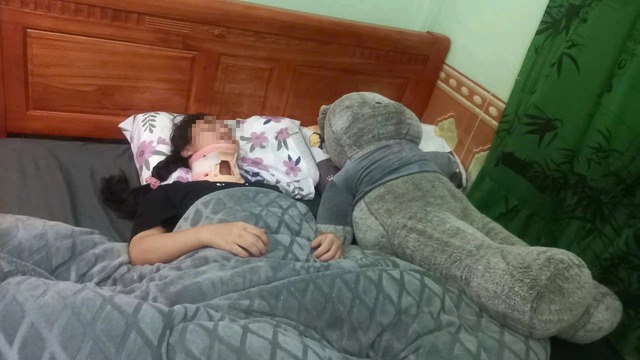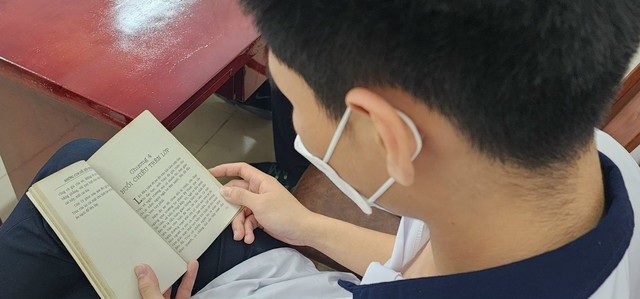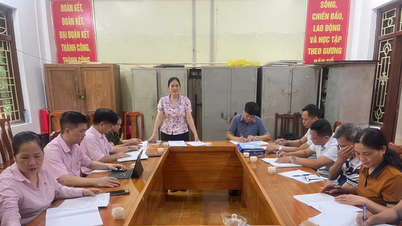Speaking to Thanh Nien Online , many teachers and psychologists said that "it is easy to expel students who violate discipline, but whether or not expelling them after school will help them become better people, live better, be kinder, and be more compassionate, that is the difficult thing." However, teachers also said that it is impossible to just remind and criticize students who violate the rules. Because there are acts of school violence by students who violate the rules that have caused very serious and long-term consequences for many students who are victims - they can be injured, disabled, and psychologically haunted for life.
Poll
Do you support the abolition of expulsion for students who violate discipline?
You can select 1 item. Your vote will be public.
Students should not be disciplined by expelling them.
The most severe form of discipline should still be expulsion if students violate discipline.
Students who violate school rules should not be expelled, but they should be sent to do community service and clean public toilets. School violence, depending on the severity, should be handled according to the law.
VoteView results
The Ministry of Education and Training has just published and solicited opinions on a draft circular regulating rewards and discipline for students, in which the most severe form of discipline, expulsion, is abolished for students who violate the law. According to the new draft circular, there are only three forms of discipline, including: warning, criticism, and requesting to write a self-criticism; expulsion is no longer a form of discipline for students. When issued, the new circular will replace Circular 08/TT of the Ministry of Education and Training guiding the rewards and discipline of students in general schools from nearly 40 years ago (1988).
No expulsion, but if students commit school violence, depending on the severity, the law needs to be involved.
Ms. Phan Thi My Hue, teacher at Nguyen Khuyen Secondary and High School, Director of Thien AnEducation Company Limited, Ho Chi Minh City shared her opinion with Thanh Nien Online .
Ms. My Hue said: "I agree with the draft not forcing students to drop out of school for violating discipline. If the school, the second home, refuses, where will the students go? If this safe door closes, will there be any door that is safe and tolerant enough to give students a place to develop and improve as well as correct their mistakes?"
However, according to Ms. My Hue, there is no longer a form of discipline such as expulsion, but that does not mean just reminding, supporting or informing the parents of students. This will lack deterrence, making it difficult for students to become good people. From there, Ms. My Hue proposed 3 solutions.
First, each school needs to have a department to manage and educate students (including the board of directors, supervisors, psychologists, homeroom teachers, subjects, Youth Union, etc.). These will be the people who meet with the students to learn, advise, talk, and inform their parents. If the problem cannot be resolved, it will be reported to the supervisor with punishments such as cleaning the classroom. If it is more serious, a psychologist will be met to find out the cause and propose the most reasonable solution, or the board of directors will directly talk and advise the students gently.
Second, for students who commit more serious violations, the school needs to coordinate with charitable organizations or the government to send them to do community service for 3 days or more. It could be cleaning the neighborhood, taking care of children, the elderly, or going to hospitals to distribute free meals...
And thirdly, for students who commit acts of school violence, there needs to be strict punishment, because the consequences are unpredictable. "The school needs to regularly organize legal activities, and can invite local police to support. If conflicts arise leading to acts of violence, depending on the severity, I think the law needs to be involved," Ms. My Hue frankly said.
In 2024, in Thanh Hoa , 6 students participated in a gang beating of an 11th grade female student (student of Nong Cong 2 High School), causing the victim to have a broken cervical vertebrae and 23% health damage. The act of school violence caused severe physical and mental damage to the victim.
PHOTO: PROVIDED BY VICTIM'S FAMILY
No expulsion but need to coordinate with many parties to educate and reform students who violate the rules
Master Pham Thanh Tuan, a civics teacher and head of the professional group at Dien Hong Secondary and High School in District 10, Ho Chi Minh City, said that in the current educational context, taking the learner as the center and adjusting student discipline measures to reduce the punitive nature and increase the educational element is a correct and urgent step. Instead of expulsion - a form that can cause long-term damage to students both academically and psychologically - measures such as reminders, criticism, writing self-criticism, psychological counseling, moral training, etc. not only help students realize their mistakes but also create opportunities for them to correct and develop.
"As an educator, I can assess that this content reflects a spirit of humanistic education, respecting children's right to education, while promoting transformation in school governance, requiring schools to strengthen coordination with families and society, building a positive, safe and tolerant school environment. This is not only a change in disciplinary regulations, but also a shift in educational thinking, from exclusion to companionship, from handling to support, so that every student has the opportunity to continue learning and develop comprehensively in terms of knowledge, personality and life skills. It can be seen that student discipline should not be coercive, but an educational process based on interaction, where teachers support students to perceive, adjust their behavior and grow from mistakes," said Master Pham Thanh Tuan.
According to Master Pham Thanh Tuan, to effectively educate and discipline students, there needs to be a support system, clear procedures, consistent expertise, and coordination between the school, family, and community. The effectiveness also depends on how teachers implement it. The way teachers deal with students who make mistakes, whether they are gentle, empathetic, or rigid, will determine the effectiveness of the disciplinary measures.
Disciplining students by sending them to the library to read books and write reviews is what many schools have done.
PHOTO: TAM NGUYEN
"At the same time, student self-criticism must be linked to each student's self-awareness so that they can sincerely examine themselves and have self-awareness. In addition, it is necessary to have influence from homeroom teachers, subjects, teachers in charge of discipline, school psychology counseling... and parents. Everyone should adjust their behavior in a positive direction to bring about educational effectiveness and humanistic values in the school. Such as evaluating students based on their little progress, recognizing changes, encouraging, motivating and accompanying them", shared the Head of the Professional Group of Dien Hong Secondary and High School, District 10, Ho Chi Minh City.
Abolishing expulsion: Necessary, but must have reasonable measures
First, if you are a good student and study well, you will not (or very rarely) violate discipline to the point of being suspended from school. Most of the students who make mistakes are those who have poor academic performance, have damaged knowledge, are bored with studying... If you are suspended from school, your knowledge will be damaged even more, you will be more bored with studying, and as a result, you will drop out of school. If you monitor the expulsions from school up to now, you can see that most of the students who receive this level of discipline do not return to school, but instead go out into the world early, sinking deeper into depravity.
Second, when suspending students from school and sending them home for a period of time, in our thinking, it is to give them a chance to repent, reform, and change; for the family to further educate them... However, this is not effective. Students who are suspended from school often feel ashamed of their friends and teachers and are less likely to want to return to school. Families and localities supervise, but that is only in theory, in reality it is very ineffective, requiring the role of the school.
Recently, some schools have come up with a humane punishment method of forcing students who violate the rules to go to the library to read books and write their thoughts. Some schools punish students by forcing them to go to school to do cleaning work on weekdays.
Many people think that the above solutions are not enough of a deterrent. However, if we have a way to continuously impact the subject, there will be positive changes. With "special" students, we should not expect changes overnight, but should be happy for the gradual, small changes of the students. I think that for these students, we also need separate management methods at school in all activities, studying, living; set a roadmap for them to strive and change. There needs to be multi-dimensional, multi-sided, continuous impact from the school, teachers, parents, students and the psychological counseling room... This will also have a deterrent effect on other students.
Ngoc Tuan
Source: https://thanhnien.vn/dong-y-khong-duoi-hoc-nhung-khong-the-chi-kiem-diem-hoc-sinh-vi-pham-185250510230550301.htm




![[Photo] Prime Minister Pham Minh Chinh attends the groundbreaking ceremony of Trump International Hung Yen Project](https://vphoto.vietnam.vn/thumb/1200x675/vietnam/resource/IMAGE/2025/5/21/ca84b87a74da4cddb2992a86966284cf)




![[Photo] Prime Minister Pham Minh Chinh chairs the Government's special meeting on law-making in May](https://vphoto.vietnam.vn/thumb/1200x675/vietnam/resource/IMAGE/2025/5/22/1c880aae96fd4e0894abc47a46fe19ba)




















































































Comment (0)